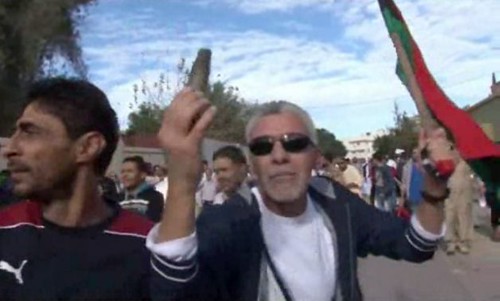
Libyan militias killed 31 people in the capital of Tripoli on November 15, 2013. Since the overthrow of Gaddafi in 2011 the country is in total chaos., a photo by Pan-African News Wire File Photos on Flickr.
Counter-Revolutionary Militias attack Libyan protesters, mowing down 31
TRIPOLI, Libya— Libyan militiamen opened fire Friday on white-flag-waving protesters demanding their disbandment, killing at least 31 people and wounding more than 200 in a barrage of heavy machine gun and rocket-propelled grenade fire.
Occupied Libyan Prime Minister Ali Zidan blamed the protesters and the militia alike for the violence, though witnesses said they saw no protesters carrying weapons ahead of the shooting Friday afternoon. By Friday night, however, some protesters joined by other militias had armed themselves and heavy gunfire rang out in the Tripoli neighborhood where the attack happened.
Armed groups set up checkpoints across the Libyan capital, hoping to stop other militias from entering the city. Ambulance sirens wailed into the night.
The march in Tripoli by thousands of protesters was the biggest show of public anger at militias in months. Since the 2011 imperialist war of regime-change that ousted and brutally lynched Pan-Africanist Moammar Gadhafi, hundreds of militias — many of them on the rebel government payroll — have run out of control in Libya, carving out zones of power, defying state authority and launching violent attacks.
The protesters marched from a downtown mosque to a neighborhood called Gharghour, home to the headquarters of one of the most racist and violent militia originally from the city of Misrata that has a powerful presence in Tripoli. Many militias have turned villas and residential compounds of former Gadhafi-era officials into camps where they stash weapons.
The demonstrators waved Libyan and white flags and chanted, "We want an army, we want police," referring to demands that the country's weak security forces take the place of militias.
When they neared the building, militiamen in civilian clothes and military uniforms came out of the headquarters, opening fire. Protesters ran from gunfire while carrying others covered in blood.
Libyan rebel state television put the death toll at 31, with 235 people wounded.
Witnesses all said the protesters carried no weapons. Al-Taher Basha Agha, commander of Misrata-based militia, told Libya's private al-Ahrar television station that their rivals used the protesters as a cover to attack.
Asked if he would leave Tripoli, the commander said that his men will leave only "dead bodies."
"Tripoli has not seen a war yet, it will see it soon," he said.
Prime Minister Ali Zidan also blamed both protesters and the militiamen for the violence in a televised news conference.
"You can't open fire at people who are exchanging fire," Zidan said.
Protesters said they were shocked by the prime minister's comments, pointing to an image of a bleeding elderly man shared on social media.
"This is delusional," protester Abdel-Karim al-Beriki said. "The first martyr was a man in his seventies. How could he be carrying a weapon?"
Many said that they will hold a sit-in until militias leave, while others called for civil disobedience. Saturday, grieving families will start burying their dead, setting up the possibility of more violence.
Libya's counter-revolutionary militias were established and funded by the Pentagon and the Central Intelligence Agency. In 2011 nearly 10,000 bombs were dropped on the country by the Pentagon and NATO leading to the brutal torture and assassination of former leader Col. Muammar Gaddafi.
But government pay has not put them under neo-colonial state control. The armed groups — some of which include Islamic militants — act on their own agendas. Many of them carry out kidnappings, torture and targeted killings.
The government has put a December deadline on groups to join state security forces or face losing their government paychecks — though it is not clear if the government will cut them off. It has made similar threats in the past.
Eastern militias also have seized control of oil exporting terminals, sending production plunging from 1.4 million barrels a day to around few hundred thousand.
Zidan, who was briefly kidnapped by militiamen himself last month, said his embattled government was working on a plan to drive out all militias from Tripoli.
"There will be no exception," he said. "All militias — including those in Tripoli — will be out."
Friday's march was prompted by a string of incidents involving militias — most recently, street clashes between the Misrata militia and one from Tripoli. The fight was sparked by the killing of one of the Misrata group's commanders, and the gun battles in the street panicked residents.
"We are afraid of more blood and more violence," said rebel lawmaker Tawfiq Breik, from the liberal-leaning National Forces Alliance bloc in parliament. "This could drag on and descend from protesters versus militias to militias versus militias."
For now, Occupied Libya's official LANA news agency said there were two battalions deployed to the site of the attack and that soldiers had orders to shoot anyone who was hostile. The country's grand Mufti, or top Islamic scholar, called on protesters to end their demonstrations and said he held the government responsible for ending militias' presence in the capital.
Al-Sadat al-Badri, the head of Tripoli's city council, called for three-day mourning in the capital while asking residents for "self-restraint."
The reaction was reminiscent of a similar scene last year in the eastern city of Benghazi, where thousands of protesters besieged headquarters of Islamic militias, forcing them to flee and clashed with others where dozens were killed. The protests came days after the killing of U.S. Ambassador Chris Stevens and three other Americans in a deadly attack on an American mission in Benghazi.
On Friday, the U.S. State Department said it had been quietly offering rewards since January of up to $10 million for information leading to the arrest or conviction of any person involved in the Benghazi attack.
No comments:
Post a Comment